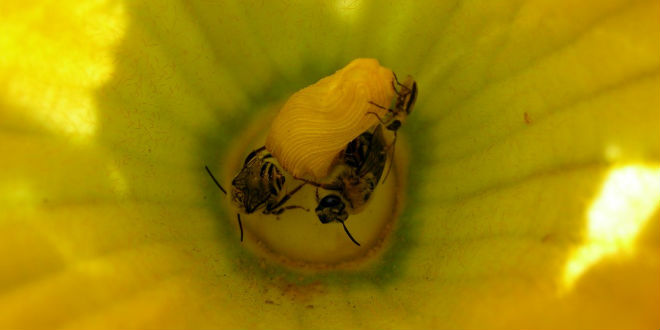Apr 17, 2017Researchers seek citizen-scientists for ‘Great Pumpkin Project’
A researcher in Penn State’s College of Agricultural Sciences is reaching out to Master Gardeners, teachers, students and other interested parties to participate in a citizen-science project that ultimately could benefit growers, crops, pollinators and the environment.
Margarita Lopez-Uribe, assistant professor of entomology, is working with collaborators at North Carolina State University on “The Great Pumpkin Project.” The project is aimed at describing the geographic distribution of important crop plants and the insects and microbes with which they interact. Data collected could help farmers one day to improve plant health and crop yields.
“By examining the complex associations among plants, herbivores, pollinators and pathogens, we hope to gain a better understanding of how crop domestication for food production is changing ecological interactions across the landscape,” she said.
The project is focusing on cucurbits such as pumpkin, squash, cucumber and melon, which explains its name, according to Lopez-Uribe.
“We are looking for citizens and students who are willing to grow plants as food, watch the progress from seed to maturity and observe the related ecological processes,” she said.
The project has several facets. A major focus of one researcher at North Carolina State is recruiting citizen-scientists to collect data on the location, abundance and persistence of a pest beetle that transmits bacterial wilt of cucurbits. The objective is to examine how relationships between plants, insects and microbes vary from place to place and what that means for plant health, crop productivity and resistance to pests.
Lopez-Uribe’s contributions to the project will center on her primary research interest: understanding how environmental change – such as shifts in land use and climate – and management practices influence changes in the population and health of wild and managed bee species.
She noted that she’s interested in having citizen-scientists help map the distribution and abundance of bees and other beneficial insects in relation to where cucurbits are grown.
Another Penn State researcher, David Hughes, assistant professor of entomology and biology, will assist the Great Pumpkin Project by utilizing the PlantVillage application that he co-developed. PlantVillage is a web-based and mobile platform designed to help growers, gardeners, Extension specialists and others around the world to identify crop diseases and other plant-health issues.
Users can upload photographs of plant disease symptoms or insects and receive feedback and advice from other users and experts in the virtual community. Using machine learning tools and artificial intelligence, Hughes and colleagues also are training neural networks of computers to recognize and identify crop diseases.
“Incorporating our platform into this new project will allow students, teachers and other participants to ask questions about the pests, pathogens and other stressors that may be affecting their plants and get advice on how to solve these problems,” he said.
Hughes believes the project also will be valuable in connecting students and other youth researchers to food production.
— Chuck Gill, Penn State University
Source: Penn State News















